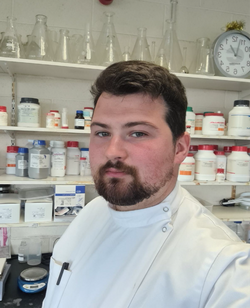Meet Early Career Microbiologist of the Year talk finalist: Aaron Curtis
Posted on September 10, 2025 by Microbiology Society
This year, the Microbiology Society is awarding Early Career Microbiologist of the Year prizes from two streams. Both prizes recognise excellence in science communication by a member who is an undergraduate, postgraduate student or within five years of appointment to their first position.
Each of the finalists, who either presented a poster or offered a talk at Annual Conference 2025, was selected to present their research in the poster or talk final. In the lead-up to the talk final, taking place on 7 October 2025 during the Executive Committee meeting, we speak to talk finalist Aaron Curtis, from Maynooth University, Ireland.

What are your current research interests?
My current research focuses on bacterial-fungal interactions, host-adaptation processes and the transition of microbes from existence in the environment to persistence and pathogenicity in human hosts. I have focused my work on Aspergillus fumigatus, a fungal pathogen that results in 600,000 deaths a year, primarily in immunocompromised and otherwise vulnerable individuals. Our work has suggested not much separates successful passaged pathogenic strains from their wild-type parents, suggesting little is required to change to cause infection. This is a bit shocking, but understanding how A. fumigatus adapts to the host can lead to surveillance for future fungal threats in the environment to find better treatments and anticipate tomorrow's emerging pathogens.
How has getting involved with Microbiology Society activities benefited your professional development?
The Society offers such a friendly and open community and really champions early career researchers, which is crucial to their development. The Microbiology Society Annual Conference has always been a benchmark in my career; it was my first international conference to attend as a first-year PhD student. I presented posters in my second and third years, and in my final year, I presented a talk at the Infection Forum during Annual Conference 2025, in Liverpool. In addition, I made many friends and got involved in quite a few collaborations through interactions at Annual Conferences. I have been able to offer my skillset to other people’s questions and have been able to receive help from others, which has elevated my research to a place I could never have gotten to alone.
What hopes do you have for the future of your research field?
I hope that there will be more investigations of what we know about existing pathogens to monitor potential emerging species as a preventative rather than reactionary response. I also hope that there are more interkingdom and interspecific interaction studies, as neither the environment nor the host represents a sterile environment. I think understanding how these species shape each other is integral to understanding the patterns we observe in the virulence of species of interest. This will require the sharing of expertise, bypassing barriers and the comfort of labels in biology, as no kingdom is unaffected by all others. Collaboration is integral to the advancement of research, and we will always have so much to learn from one another, regardless of the species/kingdom an individual is focused on.
What do you love most about your job?
I love how every day is different, some better than others, but still, they are days that you get a little closer to an answer. I love the freedom of the lab and that you can be constantly growing and find new ways to tackle a problem or optimise an experiment. I live for the days when all the data comes together to tell a story that you’ve been on the cusp of for months. I am constantly humbled and honoured to be in a position to work with amazing people who come together with their skills and expertise to contribute to our knowledge and add a piece to the puzzle to better understand a particular aspect of microbiology.
Why does microbiology matter?
We are surrounded by and shaped by an invisible world that consists of countless microorganisms from multiple kingdoms. These organisms have dynamic relationships and interactions with one another; they influence the air we breathe, the food we eat and our health, in addition to treating diseases caused by their neighbours or rivals. This microscopic world is complex, and unravelling it gives us new insights into our own lives and can advance our society in so many ways. Understanding microbiology has enabled humanity to produce the food we eat and antibiotics and to understand how our bodies function and defend us from harm. This invisible world helps and harms and shapes who we are. We can strive to unravel its complexity and very well may never fully understand it, but it is incredibly fascinating to try.
You can find and follow Aaron on X (formerly known as Twitter): @AaronC_Mycology and @aaroncurtismicro.bsky.social on Bluesky.
